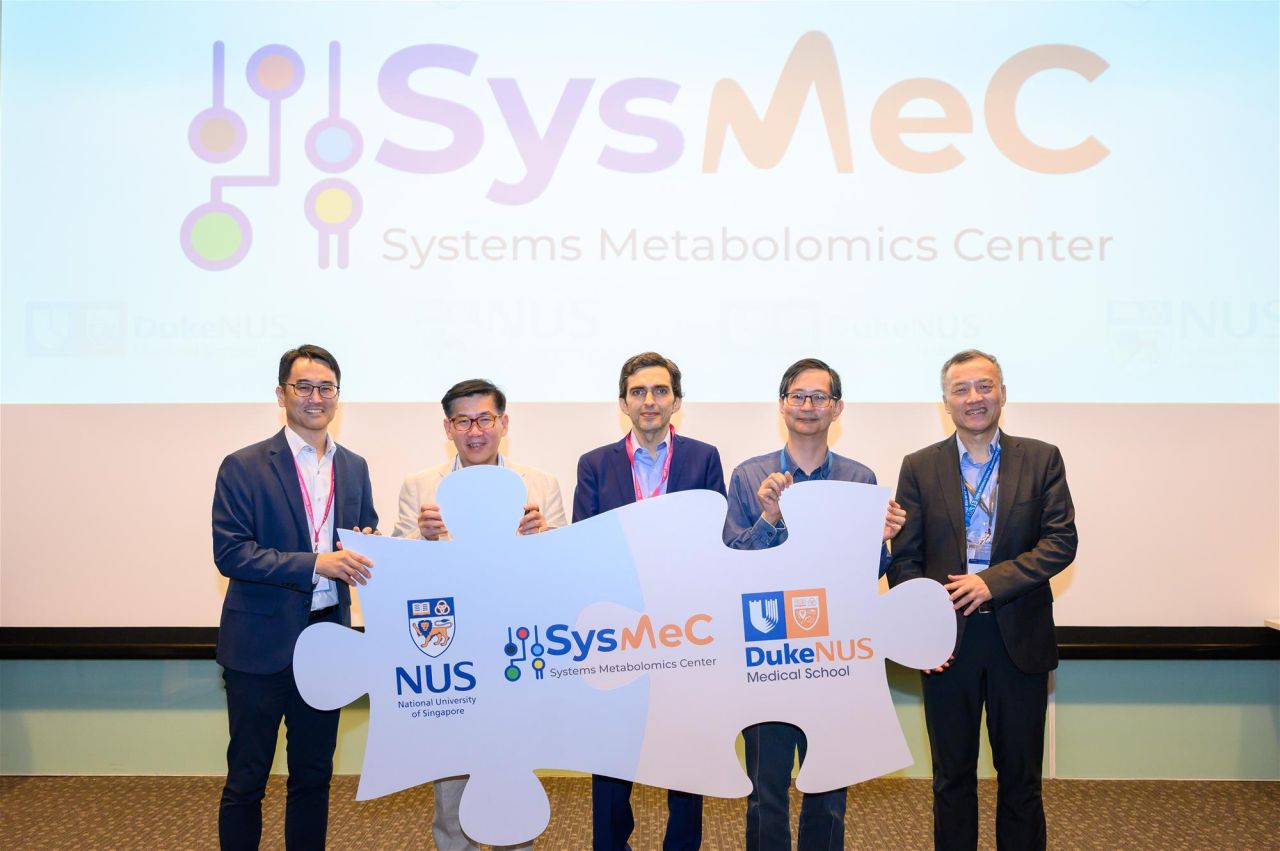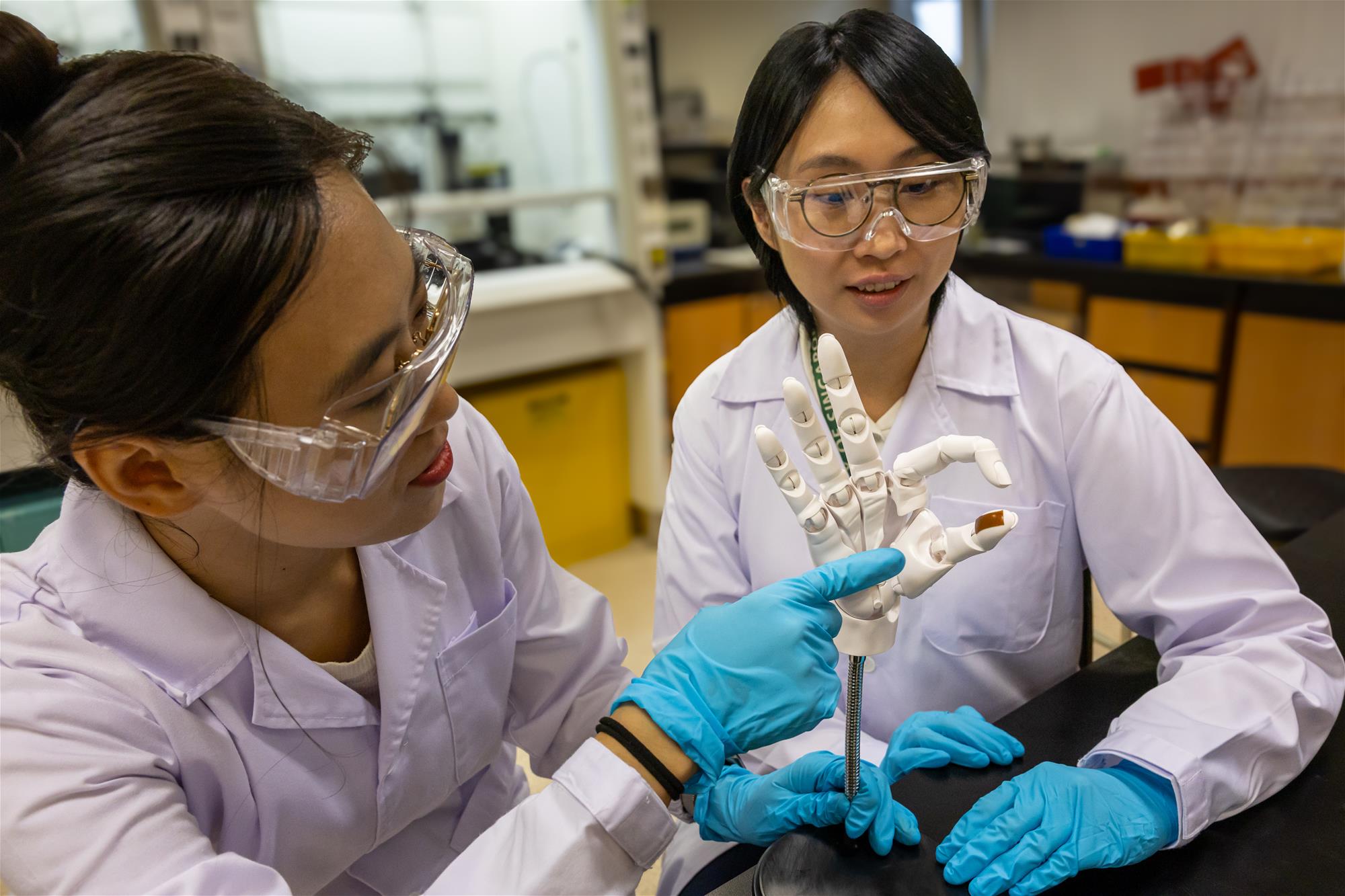Imagine being able to test a drop of blood and detect heart disease risk more accurately than current LDL-cholesterol tests—all within seconds. That’s one of the goals of the new Systems Metabolomics Centre (SysMeC), a landmark collaboration between Duke-NUS Medical School and the NUS Yong Loo Lin School of Medicine (NUS Medicine).
SysMeC is the first joint centre by Singapore’s two leading medical schools. It’s mission: to drive metabolomics research and bring precision medicine closer to reality by detecting diseases earlier and tailoring treatments with greater accuracy for better patient outcomes.
Metabolomics–the large-scale study of small molecules known as metabolites–offers a window into how our cells and tissues function. From complex metabolic diseases, like diabetes, to single-gene disorders, metabolomics holds a key to shaping precision medicine.
Mass spectrometry, the technique that can identify and quantify small and big molecules, is a cornerstone at SysMeC. This technique revealed that cells carry numerous ceramide varieties, which may be better predictors of cardiovascular problems than cholesterol and other conventional biochemistry tests.
By leveraging state-of-the-art metabolomic technologies spread over 600 sqm over two sites, SysMeC will focus on three key areas. First, enhancing large-scale population studies to uncover metabolic signatures linked to heart disease, diabetes, cancer and neurodegenerative disorders. Second, driving fundamental scientific discoveries that improve our understanding of metabolism and its role in health and disease. Lastly, accelerating the development of new technologies by fostering collaborations between leading researchers, clinicians and industry partners to create world-class analytical tools.
The centre will provide metabolomics expertise to large patient cohort studies that focus on profiling populations of healthy people and those living with specific illnesses, including collaborative projects such as DYNAMO (OF-LCG) and RESET as well as the national clinical translational programme CADENCE.

SysMeC will focus on advanced metabolomics research to revolutionise disease detection and treatment // Credit: iStock.com / Natali_Mis
"Metabolomics is a game-changer in our quest to bring precision medicine to patients. There’s still so much we don’t understand about how subtle chemical changes in our bodies influence disease. But by combining the strengths of Duke-NUS and NUS Medicine, we are poised to take a global leadership role in this transformative field. Together, we can develop non-invasive tests, detect diseases earlier and guide doctors towards the most effective treatments for each individual."
The joint centre is coordinated by Assistant Professor Federico Torta, who holds a joint appointment with Duke-NUS and NUS Medicine. According to Torta: “By bringing existing expertise and a range of state-of-the-art equipment under one roof, we strive to become a centre of excellence shaping the field of metabolomics research and partner of choice for scientists seeking to transform medical research into real-world treatments.”
Other than a pioneering project that could improve the way cardiometabolic diseases such as heart disease, diabetes and kidney disorders are diagnosed and monitored in the local population in Singapore by measuring ceramides in blood, SysMeC’s other projects rotate around the use of a new metabolomic approach called fluxomics, that measures the rates of metabolic activity, such as the movement of metabolites in and out of mitochondria, the powerhouses of cells. Metabolic reaction rates, also known as metabolic fluxes, more accurately reflect cellular activity.
Fluxomics measured by mass spectrometry has great potential in elucidating the importance of cell metabolism in stem cell differentiation, rare inherited metabolic disorders and diseases related to metabolic dysfunction such as cardiovascular disease, diabetes and obesity.

“Metabolomics is a game-changer in our quest to bring precision medicine to patients. There’s still so much we don’t understand about how subtle chemical changes in our bodies influence disease. But by combining the strengths of Duke-NUS and NUS Medicine, we are poised to take a global leadership role in this transformative field. Together, we can develop non-invasive tests, detect diseases earlier and guide doctors towards the most effective treatments for each individual,” said Senior Vice-Dean for Research at Duke-NUS, Professor Patrick Tan.
“The Systems Metabolomics Centre is set to drive biomarker discovery and metabolism research in Singapore’s rapidly evolving and dynamic research ecosystem. Through this joint collaboration, we aspire to create an exemplary model for future collaborations and a hub for industry engagement, bringing cutting-edge analytical platforms to researchers, clinicians, and innovators across the region. The potential extends far beyond metabolic diseases — SysMeC is poised to make a transformative impact across multiple domains of biomedical research,” added Professor Roger Foo, Vice-Dean of Research at NUS Medicine.
Singapore is setting the stage for a new era in precision medicine, leveraging cutting-edge metabolomics research to transform disease detection, treatment and prevention on a global scale with the launch of SysMeC.







